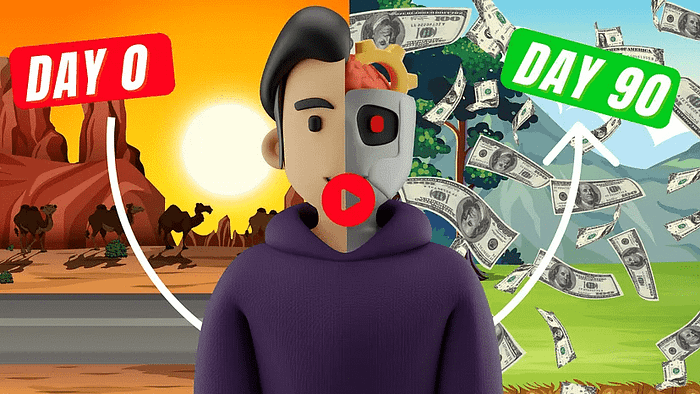The Man Who BUILT Netflix Into a $300B Streaming Giant
Revolutionary ideas often stem from solving everyday problems. In 1997, Reed Hastings and Marc Randolph transformed a simple concept into Netflix, a company that would fundamentally reshape global entertainment consumption patterns and grow into a $300 billion streaming powerhouse.
We strongly recommend that you check out our guide on how to take advantage of AI in today’s passive income economy.
Table of Contents
The Genesis of a Streaming Giant
During their daily commutes between Santa Cruz and Sunnyvale, California, Hastings and Randolph brainstormed countless business ideas. Their partnership began at Pure Atria, where Randolph served as the head of corporate marketing under Hastings’ leadership. When Pure Atria was acquired, both found themselves at a career crossroads. Hastings, contemplating a transition into education philanthropy, agreed to be an angel investor for Randolph’s next venture. This decision would prove pivotal in shaping the future of entertainment.
The journey to Netflix’s creation wasn’t linear. Randolph pitched approximately 100 different ideas to Hastings during their commutes. These ranged from personalized shampoo to custom dog food formulations. Each idea faced Hastings’ rigorous analytical scrutiny, with most being rejected. However, one concept – video rental by mail – sparked particular interest, though initially deemed impractical due to the bulky nature of VHS tapes.
The DVD Revolution
The breakthrough came when Hastings learned about DVD technology. The compact, lightweight nature of DVDs solved the fundamental logistics challenge of their mail-order concept. Rather than spending months on business plans, they immediately tested their hypothesis. They purchased a used music CD, a greeting card envelope, and a stamp, mailing it to Hastings’ house. The next morning, the unbroken CD arrived, demonstrating the viability of their concept.
With this validation, Hastings invested $1.9 million to launch the venture. Additional funding came from various sources, including Randolph’s mother. In April 1998, Netflix officially launched, marking the beginning of a revolutionary journey in content distribution.
Early Challenges and Pivotal Moments
The early days of Netflix were marked by constant experimentation. The initial business model bore little resemblance to today’s streaming giant. As Randolph often says, “There’s no such thing as a good idea – ideas are starting points, and they’re almost universally bad.” This philosophy drove Netflix’s culture of rapid testing and iteration.
Six months after launch, Netflix caught the attention of Jeff Bezos. Amazon’s interest in acquiring the fledgling company for an estimated $14-16 million provided crucial validation. However, Hastings and Randolph chose to maintain independence, believing in their vision’s potential.
The Blockbuster Saga
Perhaps the most famous chapter in Netflix’s early history involved Blockbuster. During the dot-com crash in 2000, Netflix faced significant financial challenges. The subscription model, while attracting customers, was burning through cash at an alarming rate. This led to a fateful meeting in Dallas with Blockbuster executives.
Walking into Blockbuster’s Renaissance Tower headquarters, Netflix’s team proposed a $50 million acquisition. The response? Laughter. This dismissal would become one of corporate America’s most costly misjudgments, as Blockbuster eventually filed for bankruptcy while Netflix soared to unprecedented heights.
Innovation and Culture
Netflix’s success stems largely from its unique corporate culture, shaped by both Hastings and Randolph. The company pioneered a data-driven approach to decision-making, where ideas could come from anywhere in the organization. This democratic approach to innovation, coupled with rigorous testing, became a cornerstone of Netflix’s competitive advantage.
The company’s willingness to cannibalize its own successful DVD-by-mail business to embrace streaming demonstrated remarkable foresight. This transition wasn’t just about technology – it represented a fundamental shift in how people consume entertainment.
The Streaming Revolution
The decision to move into streaming in 2007 proved prescient. While competitors hesitated, Netflix invested heavily in digital infrastructure and content acquisition. This early-mover advantage helped establish Netflix as the dominant force in streaming entertainment.
Today, with over 200 million subscribers worldwide, Netflix continues to innovate. The emergence of competitors like Disney+, HBO Max, and others has only validated Netflix’s original vision while pushing the company to maintain its innovative edge.
Future Prospects and Industry Impact
Despite its massive success, Netflix’s potential market remains largely untapped. With billions of internet-enabled devices globally, the opportunity for growth continues to expand. The company’s investment in original content production, coupled with its sophisticated recommendation algorithms, positions it uniquely in the entertainment landscape.
The proliferation of streaming services has created a new entertainment ecosystem, with Netflix at its center. Rather than viewing competition as a threat, the company sees it as a catalyst for continued innovation and improvement.
Entrepreneurial Lessons
The Netflix story offers invaluable lessons for entrepreneurs. First, success rarely comes from having the perfect idea – it comes from having a systematic approach to testing and improving imperfect ones. Second, timing and adaptability are crucial. The company’s willingness to evolve based on market feedback and changing consumer needs proved essential to its success.
Perhaps most importantly, the story demonstrates the power of persistence in entrepreneurship. Despite numerous challenges and setbacks, Netflix’s leadership maintained their vision while remaining flexible enough to adapt their approach based on market realities.
Today, Netflix stands as a testament to the power of innovative thinking, resilient leadership, and the importance of building a strong corporate culture. As the entertainment industry continues to evolve, Netflix’s journey from DVD-by-mail service to global streaming giant offers insights into the future of content consumption and the enduring principles of successful entrepreneurship.

We strongly recommend that you check out our guide on how to take advantage of AI in today’s passive income economy.




